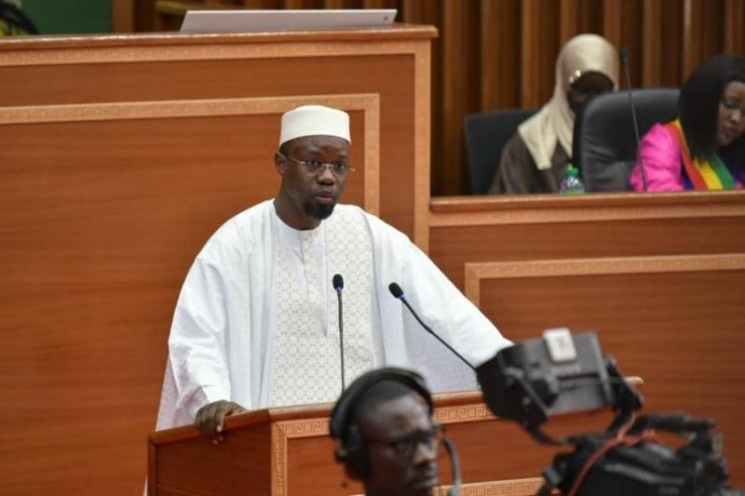Gambiaj.com – (Dakar, Senegal) – Prime Minister Ousmane Sonko, in a widely anticipated general policy statement on Friday, unveiled sweeping reforms targeting Senegal’s tax system, economic competitiveness, and social development.
The address, which had been postponed multiple times due to political tensions, marked a bold policy direction amidst what Sonko termed as a “catastrophic” economic situation.
Tax Policy Overhaul
Prime Minister Sonko announced plans to review Senegal’s 18 bilateral tax conventions, with the dual objectives of withdrawing agreements with tax havens and renegotiating unfavorable clauses in treaties with countries practicing normal taxation.
The reforms aim to curb tax evasion and ensure fair contributions from multinationals operating within the country.
“We must guarantee that Senegal benefits from the activities of these multinational corporations,” Sonko emphasized.
The proposed tax changes include increasing the corporate tax rate from its current level of under 18% to 20%, a move intended to bolster the state’s fiscal capacity.
Furthermore, the government will reduce tax exemptions for certain industries, notably cement production, and update the progressive income tax scale to reflect contemporary economic realities.
The reform will reintroduce the control and taxation system for incoming calls, which was discontinued in 2012, resulting in the Public Treasury losing hundreds of billions. Additionally, the government plans to establish a new General Tax Code, consolidate tax provisions, and unveil a revised framework for derogatory measures by the end of 2025.
These initiatives aim to equip the state with the resources needed to fund development while ensuring greater tax equity among taxpayers.
Economic Ambitions Amid Challenges
Despite a challenging economic landscape—with a 10.4% budget deficit and a public debt constituting 76.3% of GDP—Sonko expressed confidence in transforming Senegal into one of Africa’s most competitive economies. Key to this vision are the country’s long-anticipated gas reserves, now expected to be exploited by 2025, and the densification of its industrial base.
“We have the ambition to raise Senegal among the most competitive economies in Africa,” he declared.
The Prime Minister also pledged to tackle the rising cost of living and prioritize social programs aimed at improving the quality of life for Senegalese citizens.
Military and Diplomatic Measures
Sonko reiterated President Faye’s announcement to close French military bases in Senegal, a move that received applause from the National Assembly.
On the diplomatic front, the Prime Minister outlined a policy of visa reciprocity for countries requiring visas from Senegalese nationals.
The government will negotiate free visa arrangements with partner nations and extend the validity of Senegalese passports to 10 years. Measures will also be taken to streamline procedures for Senegalese citizens abroad, including the appointment of liaison magistrates and a review of partnerships with neighboring countries.
Education and Language Policy
A significant part of Sonko’s speech focused on promoting multilingualism. He announced plans to expand English instruction in elementary schools and integrate national languages into the education and training system. This initiative aims to enhance linguistic diversity and better equip Senegalese youth for global opportunities.
A Defining Moment in Leadership
Sonko’s general policy address, postponed multiple times due to political deadlock in a previously hostile parliament, set an ambitious agenda for his administration. His commitment to tackling economic, social, and international challenges was met with cautious optimism as Senegal navigates a critical period in its development.
The address signals a decisive shift in Senegal’s governance, underscoring Sonko’s determination to implement transformative policies despite significant economic and political hurdles.










